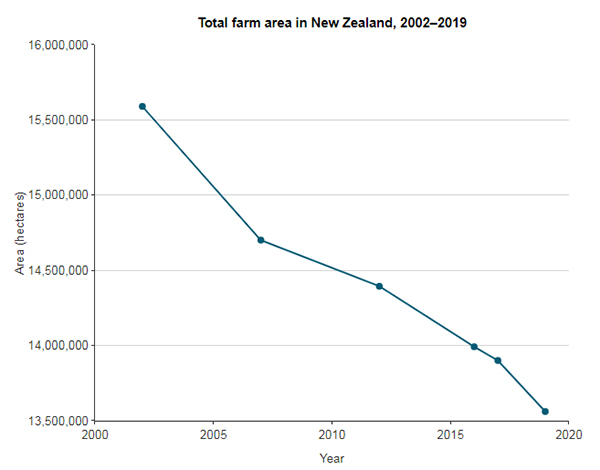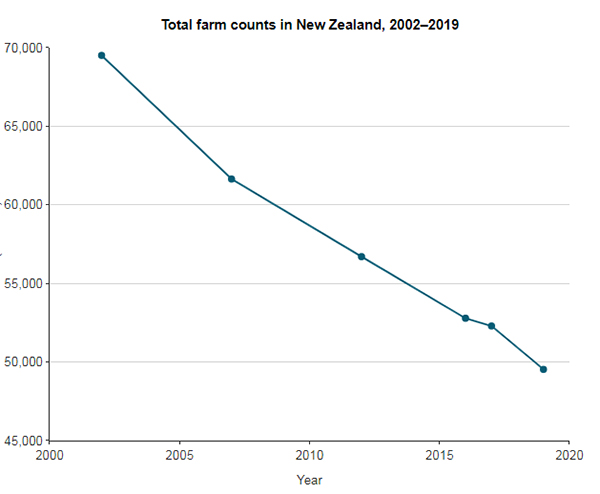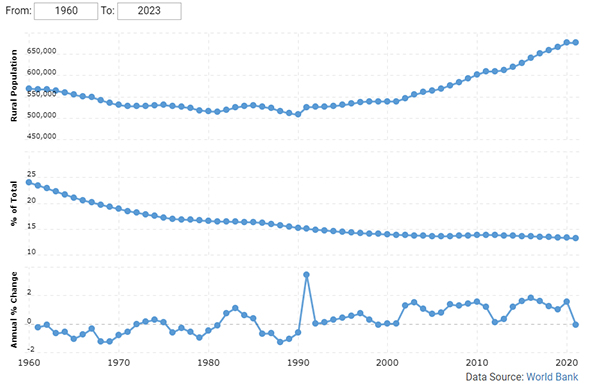
In the process of trying of looking at what the average age of farmers in New Zealand was I came across an article which, while a couple of year since being first published, added to the vague uneasiness about the state of New Zealand farming.
It was a Stats NZ publication which mentioned that between 2002 and 2019 New Zealand has lost over 2 million hectares (13%) of productive farmland. Over this period while the average farm size increased the number of individual farms decreased by nearly 20,000 from just under 70,000 farms to just under 50,000.
The average size has increased from 224 ha in 2002 to 274 ha by 2019. Seeing a reduction in farmed area is not always a bad thing as during the late 1970’s farmland expanded with the government incentives into areas which hindsight has shown to be unsustainable to be farmed (i.e. steeper ’scrubland’ etc.) when the subsidies were removed. Some of this land has now returned to native shrubs.


As alluded to last week the subsidies of the 1970’s lead to a lowering of farmer age as more new/young farmers joined the industry. Along with them it also appears that there was a general resurgence in rural populations as seen in the below graph.

A 2017 MPI report on past policies stated in regard to the reforms “Some of the negative impacts were mitigated through assistance available in the form of an exit package and some debt restructuring by the Government. Despite the hardships, very few farmers left the sector, with only about one percent of farmers taking exit packages and about five percent of farmers leaving the land between 1985 and 1989. These numbers are not significantly greater than the normal rate of farm bankruptcies. It was predicted that up to 8,000 farmers, or 16 percent, would leave the land – in fact the number was closer to 800.”
Unfortunately, the removal of subsidies and other rural services has led to the general depopulation of the rural sector to the point where New Zealand is now one of the most urbanised societies in the world. In the period where MPI say 800 farmers left the land, the World Bank data shows a rural depopulation of around 20,000. The result is we now sit in the top 50 most urbanised countries in the world, slightly ahead of Australia. Approximately 87% of our population reside in urban settings. Perhaps not what the common impression is. New Zealand is fortunate in that although as a percentage the rural population is decreasing, the actual population is increasing and as the area being farmed is increasing there still should be a labour source to work the land.
Despite the concerns of too much land going into forestry and being the most recent driver of rural depopulation, assuming the numbers are accurate, in 2001 there was 1.8 million ha in plantation forestry whereas in 2019 there a tad under 1.7 million ha.
What none of these numbers show however, is where the depopulation is occurring.
It tends to be in the areas that can least afford it such as East Coast New Zealand parts of rural Southland and the like. The current mode of both major parliamentary parties to centralise services will mean this trend is not going to be reversed anytime soon.
Since 2019 no doubt some additional plantation planting has occurred but this comes on top of the 13% farming losses. This the leads to the conclusion that urban sprawl is the major contributor to the reduction of land. This has been covered recently with the government now putting restrictions on the amount of land use change permissible but as with all policies it takes a while to redirect the ‘ship’ with existing permits allowed to run their course. So, this takes me back to the issue raised last week around the aging demographic of New Zealand farmers.
Given the land area has reduced by 13% and the number of farms by 20,000 the true issue around the age of New Zealand is actually a lot worse than the initial stats would indicate.
It is a similar issue that concerns New Zealand wool growers. If it wasn’t for the fact that the New Zealand sheep flock has decreased by almost two thirds (and falling) there would be a major panic about where the shearers are coming from. As it is those within the industry are concerned. Unfortunately StatsNZ were not able to shed light on the data as in response to an enquiry for demographics I was supplied data which stated there were (only) 5,400 sheep farmers in New Zealand and any further mining of data was going to cost $155 per hour. I replied I didn’t have confidence in any future data emanating from the Department, given that in fact there are about 23,000 sheep and beef farmers. Hopefully the next census comes up with some better (more useful) data.
30 Comments
A genuine concern. NZ as a distinct identity is Māori culture and farming families. Life in our cities is life that is little different from any 2nd rank global city.
Worth noting that the majority of NZ's landmass has too many houses and too few inhabitants.
You think the rest of the world doesn't have farming families? The typical city resident is identical to a Dubliner but a farmer is totally different to an Irish farmer?
To me your statement comes across as an insult to the majority of kiwis that live in urban areas.
My apologies. I've only lived in NZ for 20 years. The image the rest of the world has of NZ is pure and green. I live in Auckland North Shore and prefer living here than in alternative cities in the UK. So I do appreciate the Kiwi urban lifestyle - my point is that an Ikea in Auckland, a coffee shop in Auckland, an apartment block in Auckland, a shopping mall in Auckland is not different than the same in other countries. I can drive out of the city and be in green distinctively NZ barely inhabited valleys in half an hour.
Farming in NZ is mainly farming for export; our cows live in fields not cowsheds; the flora and fauna of NZ is especially distinctive. If you were to draw a picture that would indicate 'this is NZ' to outsiders it would not be the govt Beehive or any building in Auckland - it would be a rural picture whereas the equivalent for the UK is Tower Bridge and for the USA the statute of Liberty or equivalent cityscape.
why the statue of liberity and not saw the cattle ranches of montana? The USA is famous for far more than Manhattan.
why not the rolling fields of the UK?
Basically i reject black and white thinking that NZ image = farming, UK image = cities.
Take a look what google image search has to say about new zealand, plenty of urban focus, along with the remote empty countryside, and just about no images of farm land.
I guess the big difference is a lot of our farming is fairly world leading, which you'd expect given we have a unique cold/hot climate and enough moisture.
Our cities have some nice scenery, but on a world stage they can't compete with the likes of New York or Tokyo.
Try buying your way into farming. It is completely unaffordable. You need at least 3-5M in cash to buy a large enough portion of productive land that you could turn a decent profit.
Farming has become an aristocratic profession dominated by the families who kept their farms over the last 80-160 years.
The average age of farmers has grown enormously since no one but these landed planters can afford to buy in.
Farms are expensive but habitation is not. It is because a typical farm is run by a single family whereas 100 years ago they would have employed six farm labourers each with a house and family. There are so many old houses moldering away in rural areas. It was the same in the Highlands of Scotland when I lived there fifty years ago. Deserted rural homesteads and small zombie towns; it is much the same all over the world. The difference is that NZ is a country with an economy based on farming (and maybe tourism?).
Fossil fuels have much to answer for.
That's the answer to our GHG problem, methane will automatically drop if FF are properly accounted for, that is no offsets and effective pricing.
What i see around my neck of the woods are Dairy farms progressively taken over by investors / partnerships and employing farm managers. The actual owners dont know / dont care about farming itself, but they can count the ROI.
My neck of the woods it's more about current dairy farm owners collecting more farms. Vast majority of their offspring are uninterested in farming (one large family the siblings have a total of 23 offspring with only one farming and the idiots aren't allowing that one into their circle ), possibly cause they are generally crap employers. Currently in our area there are three contract milking jobs advertised that pay at or below minimum wage. I don't really see things changing soon, most farming advocates are to busy trying to remove the demon communists from government to care about what their industry will look like personal wise in 10 or 20 years time.
From the stats. 13% rural population producing 81% of exports. Insane. What the heck are the rest doing?
What the heck are the rest doing?
Buying and selling houses to each other
You can get into farming, just don't expect your first one to be hundreds of hectares of premium pastureland.
One issue I see for rural towns is the provision of public services. There is no chance of providing care, health, police, fire services etc. unless they can retain young people. However as they tend to be aging more rapidly than the general population the workers to support retirees are not available.
My mother used to work for the Scottish Highlands and Islands development board. Its purpose was to stem depopulation. They found the critical issue is jobs for young women. A girl leaves school and is forced to go to the city for work. Many young men are willing to stay put with the pleasures of hunting, fishing and general freedom out weighing the hard work for low pay. But they leave the rural life to find women. So it is all those govt admin jobs that need to be retained; small schools kept open, permanent jobs in tourism, post offices, banks, pubs.
One suggestion on how to reduce this depopulation is to reverse the bands for accommodation allowance. When my daughter had her child she was able to claim $375pw for her accommodation if she remained in Auckland but from memory I think it was $80 if she lived in a remote area. I'm surprised the Māori party don't make this a policy.
The rural population decline stems from education.
My generation all went to University and all of us have gone onto employment, mostly off farm.
Most of our parents went back onto the farm as soon as they either reached 15 years of age, or completed school cert.
Key now is how to entice urban school leavers onto the farm, and what do these career pathways look like?
When I was a chimney sweep, I discovered many middle-aged people who hated the bustle of the city and were happy living without another house in sight (this was within Auckland's boundary so NZ stats would not count them as rural). Generally they were rather artist types. I also noticed the elderly tended to move back into town - often very reluctantly from the house they had lived in for decades but for social and medical reasons.
What is the definition of rural and urban? Where do lifestyle blocks fit in ?It would be very hard to compare greater Auckland with greater London, or even somewhere like Sydney . Then look at Wellington , many urban addresses would have farmland or bush over their back fence.
Great to see this discussion starting - welcome to this century
A lot of the land "lost" is simply uneconomic and has reverted to native.
Exotic forest numbers are right - its shrunk as well
Population - you don't need to go to stats - leading demographers have been shouting this from the roofs for the last 10 years plus and no one listens.
https://www.farmersweekly.co.nz/opinion/its-not-just-trees-scaring-the-…
https://www.farmersweekly.co.nz/news/implications-of-aging-rural-popula…
Its not just here but all over the world
The Europe has over 300,000ha of farm land ABANDONED each year - no people to work the land and ageing populations.
what needs to happen is we need to retire 30% of all farm and production forest land to permanent cover and then we may just have enough people to work the rest in 15 to 20 years time.
Many rural regions in NZ will have a 10 to 30% reduction in working age populations in the next 10 to 15 years.
Plan and adjust or its going to happen, as it is now, and people will try to blame someone else.
Just look at any demographic age distribution
In the 1920s sociologists proved immigrants move to cities. That is why London, Auckland, Paris have many immigrants and UK, NZ & France country areas have few. Even if you deliberately bring in immigrants to work on farms their children will have few ties to the locality and move to the city. You do have an opportunity to get older city-dwelling Kiwis once their family has left home to reverse the trend and move back to where they were born.
Exactly - then these older people need health and support services which aren't there and young people that are there then have a choice to work on the land or service older people - what pays the best?
This is what has happened in Hawaii - farm land abandoned as all the young people who are left work to support the retirees or the tourism industry and farm land is in fallow as they cant get anyone to work on it.
I think there is depopulation. But why is noone saying that the data here is showing an increase in population of 100,000?
What counts as Rural vs Urban? If people move to Rangiora from Christchurch are they urban or rural? So many satellite towns are now just glorified suburbs of the closest major city, and people are moving there to buy affordable houses and commuting or working from home.
Loss of farmland has flow on consequences, something this Labour Govt doesnt get. A reduction of 20-25% in meat and dairy production (as proposed) not only means loss of farm people and products, but it also makes all the secondary businesses unprofitable as well - so the milk/meat processing factory shuts down, the farm supplies store closes, the large animal vets leave, and so on. Its not just farm jobs that are at risk.
Government/Global policy to destroy farming is working really well. Regions like Southland, Otago, Westland have similar population densities to Lapland. NZ as a whole has the highest areas of protect land in the OECD but this is never enough for the anti farming zealots. Carbon bludging boondoggles are just the next twist of the knife to enrich the rent seekers and empty out rural communities.
"Under new EU rules, both house crickets processed into powder and grain mold beetle larvae will be allowed as ingredients in food, said an online announcement on Tuesday."
https://www.aa.com.tr/en/europe/house-rickets-allowed-as-ingredient-in-…
And what is the governments motive to "destroy" farming ????
Quite simple - Noble Cause Corruption. These hand wring zealots like Ardern, Hipkins, Shaw, Luxon, Willis etc actually believe destroying pastoral agriculture is providing "leadership" for the planet. They grudgingly admit they can't change the climate so all they can cling on to is "leadership" - whilst the globe burns record amounts of coal and oil in 2022. Thanks for the leadership.
https://www.interest.co.nz/rural-news/119539/angus-kebbell-notes-simpli…
Can you name any other business in NZ where state sanctioned policy exists that provides a funding stream to buy out and shut down sheep/beef farms at double/triple the capital value of the business? People who produce a public good and export receipts have to compete with a artificial carbon construct with zero benefit to society - other than to the rent seeker/political class.
The abandonment of rural infrastructure is rampant. My relative has a public bridge that bisects his farm. The bridge, along with many others in the region, has been red stickered so he cannot use the bridge the family has been using for the past 120 odd years, in one form or another. He cannot buy the bridge and fix it himself, nor can he buy the public road. He has to completely reroute his farming operation, live on a now dead end road, and suck it up while spending a fortune on rates and fuel taxes.
Had cup of tea with a punter this week. Recent slip on their road, which is shared with a number of farming and lifestyle neighbours, reduced to a single lane and no access for heavy vehicles. Been advised not fund funding available to fix slip for three years. Tough luck export receipt generating rural punter. Imagine these scenarios playing out in urban welfare dependencies - sorry chaps your bridge is out - see you in three years.
Leadership - solving problems that aren't there to garner votes and line pockets.
"Academics can quibble (it’s what we do best) about the exact factors, but the fact that this formula is vastly more accurate than the traditional accounting rule is indisputable.
Even more strikingly, if an individual herd’s methane emissions are falling by one third of one percent per year (that’s 7/2100, so the two terms cancel out) – which the farmers I met seemed confident could be achieved with a combination of good husbandry, feed additives and perhaps vaccines in the longer term – then that herd is no longer adding to global warming."
https://www.newsroom.co.nz/ideasroom/a-climate-neutral-nz-yes-its-possi…
I'm sorry that's not rational and is the cause of a lot of misguided angst. Take the time to research the demographics and what is happening all over the world. It's no one's fault and simply that young people have options. Its a simple market based issue where other occupations will provide things, pay, location, hours etc which is more appealing. I know a lot of people who like farming but find other options more appealing and choose that route. Very different to 20 to 40 years ago. Combined with lower birth rates and a reducing working age population competition for labour will only become tougher.
Maybe we need an immigration class for people willing to stay in a rural area ,and invest in intensive agriculture on a sustainable model.

We welcome your comments below. If you are not already registered, please register to comment
Remember we welcome robust, respectful and insightful debate. We don't welcome abusive or defamatory comments and will de-register those repeatedly making such comments. Our current comment policy is here.